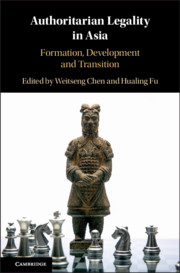Book contents
- Authoritarian Legality in Asia
- Authoritarian Legality in Asia
- Copyright page
- Contents
- Tables
- Notes on Contributors
- Acknowledgments
- Abbreviations
- Introduction Authoritarian Legality, the Rule of Law, and Democracy
- Part I Framework
- Part II Authoritarian Legality
- Showcase of Authoritarian Legality and Its Potential Erosion
- 2 The Concept of Authoritarian Legality
- 3 Rule-of-Law Reform and the Rise of Rule by Fear in China
- 4 The Foreign NGO Law and the Closing of China
- City Jurisdictions with a Colonial Common Law Tradition
- Ancient Power with Civil Law Foundation
- Emerging Case
- Part III Authoritarian Legality in Transition
- Index
4 - The Foreign NGO Law and the Closing of China
from Showcase of Authoritarian Legality and Its Potential Erosion
Published online by Cambridge University Press: 14 July 2020
- Authoritarian Legality in Asia
- Authoritarian Legality in Asia
- Copyright page
- Contents
- Tables
- Notes on Contributors
- Acknowledgments
- Abbreviations
- Introduction Authoritarian Legality, the Rule of Law, and Democracy
- Part I Framework
- Part II Authoritarian Legality
- Showcase of Authoritarian Legality and Its Potential Erosion
- 2 The Concept of Authoritarian Legality
- 3 Rule-of-Law Reform and the Rise of Rule by Fear in China
- 4 The Foreign NGO Law and the Closing of China
- City Jurisdictions with a Colonial Common Law Tradition
- Ancient Power with Civil Law Foundation
- Emerging Case
- Part III Authoritarian Legality in Transition
- Index
Summary
Since Xi Jinping came to power in late 2012, the party-state has moved to increase its control over virtually every important element of Chinese public life, including the media, the Internet, academia, civil society organizations, rights activists and lawyers, the legal profession, and arts and culture. The crackdown on civil society has been particularly damaging. Many of the top rights advocacy organizations in China have been targeted: some have been forced to scale back their work, while others have been shut down. In other words, whereas in the past, the party was willing to tolerate some degree of activity outside of party-sanctioned zones, it now wants a less crowded playing field, one in which it plays a larger role. At the same time, the CCP has also sought to tightly constrict foreign influences. Whereas law was once seen as a tool to facilitate foreign engagement in China, it is increasingly being used to control – or even block – international engagement that the Party sees as problematic. The passage of the Foreign NGO Law, which heavily regulates the activities of international NGOs and foundations, represents a new chapter of China’s engagement, both with domestic civil society, and with the international community.
Keywords
- Type
- Chapter
- Information
- Authoritarian Legality in AsiaFormation, Development and Transition, pp. 114 - 140Publisher: Cambridge University PressPrint publication year: 2020
- 1
- Cited by



